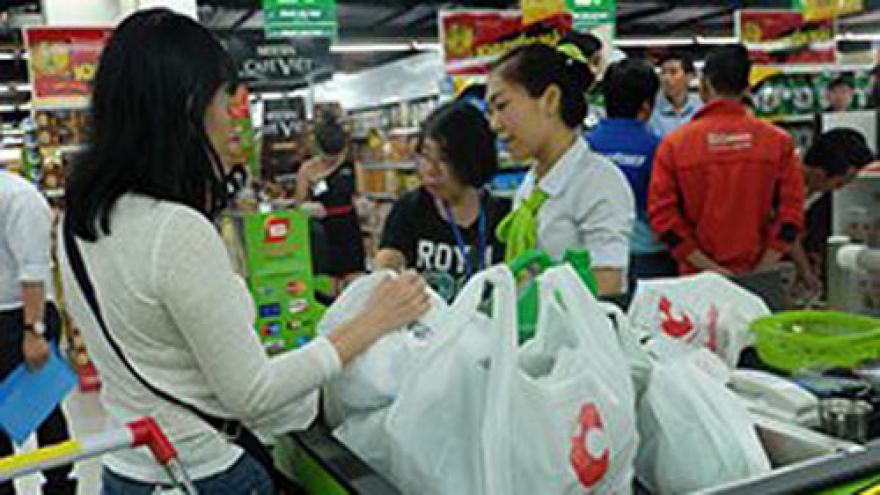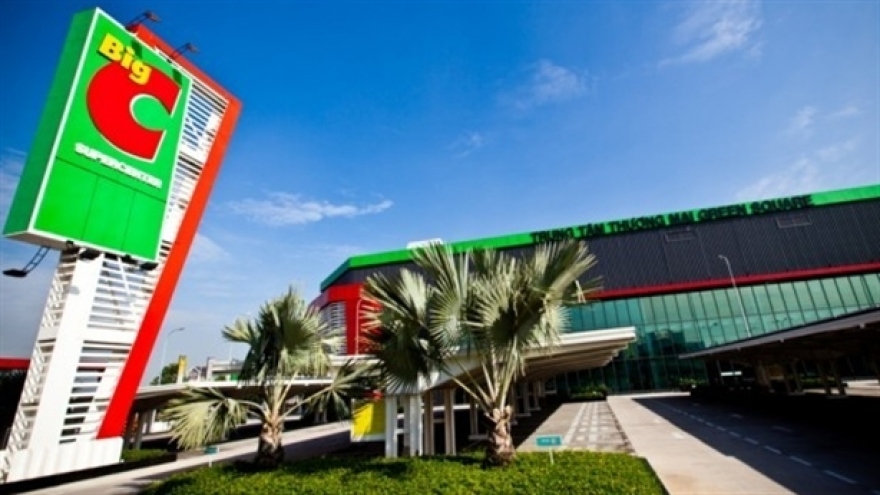Suppliers protest Big C demands
The Vietnam Association of Seafood Exporters and Producers (VASEP) has asked the supermarket chain Big C to refrain from asking for higher discount rates from Vietnamese suppliers, and has recommended a maximum rate of 15%.
 |
Thai food products could end up dominating the shelves of Big C Vietnam’s outlets, one of the country’s biggest supermarket chains, now owned by Thailand’s Central Group, experts have warned.
Setting up its new empire, the Thai firm has asked for higher discounts from Vietnamese food processing enterprises, forcing them to withdraw from the retail system.
Among the supermarkets in Vietnam, Big C has the highest discount from suppliers, of 17-20%, 5% higher than the rate last year, according to a director of a Vietnamese seafood processing enterprise.
In addition, numerous products have discount rates of up to 25%.
Along with unreasonably high discounts, Vietnamese enterprises have to cope with many fees, including fees for Big C’s promotions, product testing, customer festivals and Big C birthdays, as well as other minor fees.
Nguyen Hoai Nam, deputy general secretary of VASEP, said the average discount that enterprises in the seafood processing sector could accept was 15%, and that Big C’s 17-20% discount was too high.
Le Thanh Tam, deputy director of Saigon Food Joint-Stock Company, said to ensure the profit of enterprises, appropriate discounts should be about 10%.
Pham Hai Long, general director of Agrex Saigon Foodstuffs Joint-Stock Company, said that increased discount rates could be one of the Central Group’s ways to dominate the retail market in Vietnam.
The high discount would restrict Vietnamese enterprises from becoming suppliers to Big C, opening the road for Thai producers to gradually replace them, he added.
Long said the company had withdrawn its products from Big C, and had shifted to other distribution channels. The company has also begun exporting to Japan and the Republic of Korea.
Higher discounts help Big C lower product prices, creating a competitive advantage over other supermarkets and retailers.
Thai products could dominate the retail market if Vietnamese enterprises lose the pricing war with Thai retailers, experts have warned.
Future preparations
In recent years, Vietnamese retail firms began to adopt better retail practices as more merger and acquisitions (M&A) occurred.
Nguyen Huong Quynh, general director of the market research company Neilsen Vietnam, said Vietnamese enterprises faced opportunities as well as challenges in the more liberalised trade environment.
To better compete with foreign products, domestic businesses must improve the quality of products and maintain a reasonable price as well as enhance their competitiveness capacity in the market, she said.
“Most importantly, Vietnamese firms must take the initiative to prepare for the battle with foreign rivals,” Quynh added.
The recent penetration of foreign retailers from Thailand, Japan and France has hastened the race for market share in the Vietnamese retail sector.
This sector has large untapped potential, with strong purchasing power from a population of 90 million.
However, local retailers are still the underdogs, and some are crying for help.
The HCM City Union of Business Associations recently sent a document to the Prime Minister about risks caused by the domination of foreign retailers in local retail markets.
The association has called for more support for a more favourable business environment.
According to the association, modern retail in Vietnam accounts for a mere 25% of total retail sales.
It is facing increasingly harsh competition from foreign retailers such as Big C, with its 32 supermarkets, Metro with 19 supermarkets, Lotte Mart with 11 supermarkets and Aeon with three supermarkets.
France’s fourth largest retailer, Super Auchan, is also planning to expand its supermarket chain in HCM City.
In addition, a series of mergers and acquisitions include Aeon buying stakes of Fivimart and Citimart, and Thai groups acquiring Big C and Metro, the association said.
Local retailers should work with producers to build supply chains for Vietnamese quality products to gain the trust of consumers and build brand names, experts have said.
Economist Ly Truong Chien said Vietnamese retailers must improve their operation models and cooperate by using modern retail techniques and trends, such as developing convenience stores and minimarts.
However, Vo Van Quyen, director of the Ministry of Industry and Trade’s Department of Domestic Market, said the opening of stores by foreign retailers was not a major problem.
For local retailers, it presents an opportunity to improve their competitiveness and prevent shut-downs or bankruptcies as a result of failures to compete.
For consumers, foreign retailers bring high-quality products to Vietnam and contribute to improving the quality of made-in-Vietnam products by upgrading the quality of merchandise found on shelves, Quyen said.


